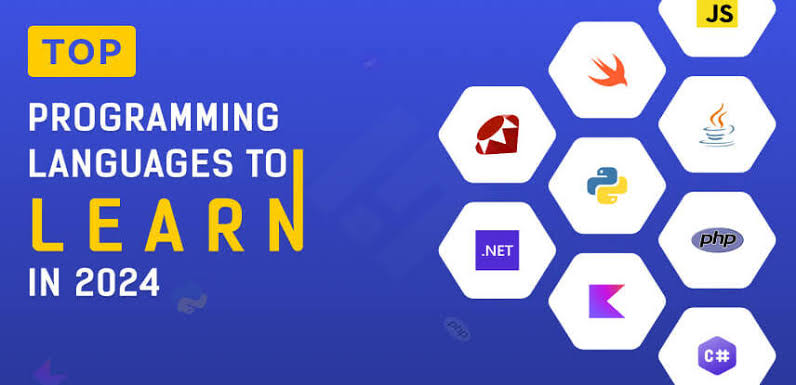Top 10 Programming Languages to Learn
Explore the top 10 programming languages to learn, including Python, JavaScript, Java, and more. Discover their unique features, applications, and why they are essential for today's technology landscape. This guide helps you choose the right language for your career and projects.
Top 10, Tech | August 8, 2024
Explore the top 10 programming languages to learn, including Python, JavaScript, Java, and more. Discover their unique features, applications, and why they are essential for today's technology landscape. This guide helps you choose the right language for your career and projects.
Programming languages form backbone of software development world. Each offers unique features and serves different purposes. As technology landscape evolves new languages emerge. Established ones continue to play critical roles in various domains. For aspiring developers or seasoned professionals, choosing right programming language can be pivotal. This comprehensive guide explores ten significant programming languages to learn. It details applications strengths and reasons they stand out in modern programming ecosystem
1. Python
Python has become one of most popular programming languages due to its simplicity and versatility. Designed with readability in mind Python's syntax is straightforward. This makes it excellent choice for beginners. Its extensive libraries and frameworks—such as Django and Flask for web development and TensorFlow and PyTorch for machine learning—enhance usability across various domains. Python is also widely used in data analysis artificial intelligence and scientific computing. This makes it valuable skill for numerous tech-driven careers
2. JavaScript
JavaScript is essential for web development enabling interactive and dynamic features on websites. As client-side language it runs in browser. This allows developers to create responsive and engaging user experiences. With rise of frameworks and libraries like React, Angular and Vue.js JavaScript has evolved from simple scripting language to powerful tool for building complex web applications. Moreover, Node.js extends JavaScript’s capabilities to server-side programming. This further cements its importance in full-stack development
3. Java
Java remains cornerstone of enterprise software development due to its robustness scalability and cross-platform capabilities. Known for "write once, run anywhere" philosophy Java applications can run on any device equipped with Java Virtual Machine (JVM) It is widely used in large-scale systems. Also in Android app development and server-side applications. Java’s strong community support and extensive libraries contribute to ongoing relevance in tech industry
4. C#
Developed by Microsoft C# (pronounced C-sharp) is versatile language primarily used for developing Windows applications and games. It is integral to .NET framework, which provides comprehensive platform for building deploying and managing applications. C# is known for its modern syntax and features. These include object-oriented programming and strong type checking. This makes it suitable for range of applications. From enterprise software to game development with Unity.
5. C++
C++ is powerful language known for performance and efficiency. It extends capabilities of C with object-oriented features. This allows for more complex and scalable applications. C++ is widely used in system programming game development and applications requiring high performance. This includes real-time simulations and embedded systems. Its ability to provide low-level access to memory and hardware makes it preferred choice for performance-critical applications
6. Ruby
Ruby is renowned for elegant syntax and focus on simplicity and productivity. It is best known for Ruby on Rails framework. This framework facilitates rapid development of web applications. It provides a set of conventions and tools. Ruby’s philosophy emphasizes developer happiness and efficient coding practices. This makes it a popular choice for startups and small teams aiming to build and deploy applications quickly
7. PHP
PHP (Hypertext Preprocessor) is server-side scripting language designed for web development. It is widely used to create dynamic web pages and server-side applications. Despite facing criticism over security and performance in past PHP remains significant language due to its ease of integration with databases. It has extensive support across hosting platforms. It powers many popular content management systems such as WordPress and Drupal. This makes it important language for web developers
8. Swift
Swift developed by Apple, is relatively new language designed for iOS and macOS application development. It aims to provide modern safe, fast programming experience. Features enhance performance and readability. Swift’s integration with Apple’s ecosystem makes it go-to language for developing applications for iPhone iPad, Mac. Its growing popularity and continued support from Apple make it valuable language for mobile app developers
9. Kotlin
Kotlin created by JetBrains, has gained traction as alternative to Java for Android development. It is designed to be fully interoperable with Java. It offers modern features such as null safety concise syntax and functional programming capabilities. Kotlin’s adoption by Google as official language for Android development has significantly boosted its popularity. This makes it essential skill for mobile developers working within Android ecosystem.
10. Rust
Rust is systems programming language focused on performance safety and concurrency. It is designed to provide control of low-level languages like C++ while incorporating modern features that prevent common programming errors. This includes memory leaks and data races. Rust’s emphasis on safety and performance has garnered attention for its use in building reliable and efficient systems software. Its growing community and increasing adoption in industries such as web assembly and blockchain technology highlight its potential for future developments
Choosing the Right Language
Selecting right programming language often depends on individual goals project requirements and career aspirations. For those starting in programming, Python and JavaScript offer gentle introduction with their broad applications. They also have supportive communities. For individuals interested in enterprise software or Android development Java and Kotlin provide valuable opportunities. Meanwhile, C++ and Rust cater to those seeking to work on performance-critical or systems-level projects.
The dynamic nature of technology landscape means that programming languages continually evolve. New languages emerge and existing ones adapt to new trends and requirements. Staying informed about industry developments is crucial. Continually expanding one's skill set can help programmers remain relevant and adaptable in ever-changing field.





